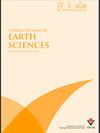Soil liquefaction and subsidence disaster in İskenderun related to the 6 February 2023 Pazarcık (Mw: 7.7) and 20 February Defne (Mw: 6.4) earthquakes, Türkiye
IF 1.1
4区 地球科学
Q3 GEOSCIENCES, MULTIDISCIPLINARY
引用次数: 0
Abstract
: The Mw 7.7 Pazarcık earthquake on February 06, 2023, struck southern Türkiye, causing typical liquefaction along the shores of İskenderun Bay. This liquefaction was characterized by lateral spreading, subsidence, and flooding. Subsidence-triggered sand ejecta, water flows, and opening cracks were identified in areas spanning approximately 2 km in length and 300 m in width. Based on coastal references such as lighthouses or harbor platforms, settlements of 0.8 m and lateral spreading of 0.4% were recorded along the coastal zone following the Pazarcık earthquake. According to camera recordings, liquefaction-related water and silty sand outflows occurred 29 min after the earthquake. The largest water outlet observed had dimensions of 2 m in length, 1 m in width, and 0.5 m in depth. Images captured at the moment of liquefaction show water gushing for 2 m.与 2023 年 2 月 6 日 Pazarcık 地震(震级:7.7)和 2 月 20 日 Defne 地震(震级:6.4)有关的 İskenderun 土壤液化和沉降灾害,土耳其
:2023 年 2 月 6 日发生在土耳其南部的 Pazarcık 7.7 级地震造成伊斯肯德伦湾沿岸典型的液化现象。这次液化的特点是横向扩展、下沉和洪水泛滥。在长约 2 公里、宽约 300 米的区域发现了由沉降引发的沙喷射、水流和开口裂缝。根据灯塔或港口平台等沿海参照物,帕扎尔奇克地震后沿海地区记录到 0.8 米的沉降和 0.4% 的横向扩展。根据相机记录,地震发生 29 分钟后,与液化有关的水和淤沙流出。观察到的最大出水口长 2 米、宽 1 米、深 0.5 米。液化瞬间拍摄的图像显示水流涌出 2 米。
本文章由计算机程序翻译,如有差异,请以英文原文为准。
求助全文
约1分钟内获得全文
求助全文
来源期刊

Turkish Journal of Earth Sciences
地学-地球科学综合
CiteScore
2.40
自引率
10.00%
发文量
6
审稿时长
6 months
期刊介绍:
The Turkish Journal of Earth Sciences is published electronically 6 times a year by the Scientific and Technological Research
Council of Turkey (TÜBİTAK). It is an international English-language journal for the publication of significant original recent
research in a wide spectrum of topics in the earth sciences, such as geology, structural geology, tectonics, sedimentology,
geochemistry, geochronology, paleontology, igneous and metamorphic petrology, mineralogy, biostratigraphy, geophysics,
geomorphology, paleoecology and oceanography, and mineral deposits. Contribution is open to researchers of all nationalities.
 求助内容:
求助内容: 应助结果提醒方式:
应助结果提醒方式:


